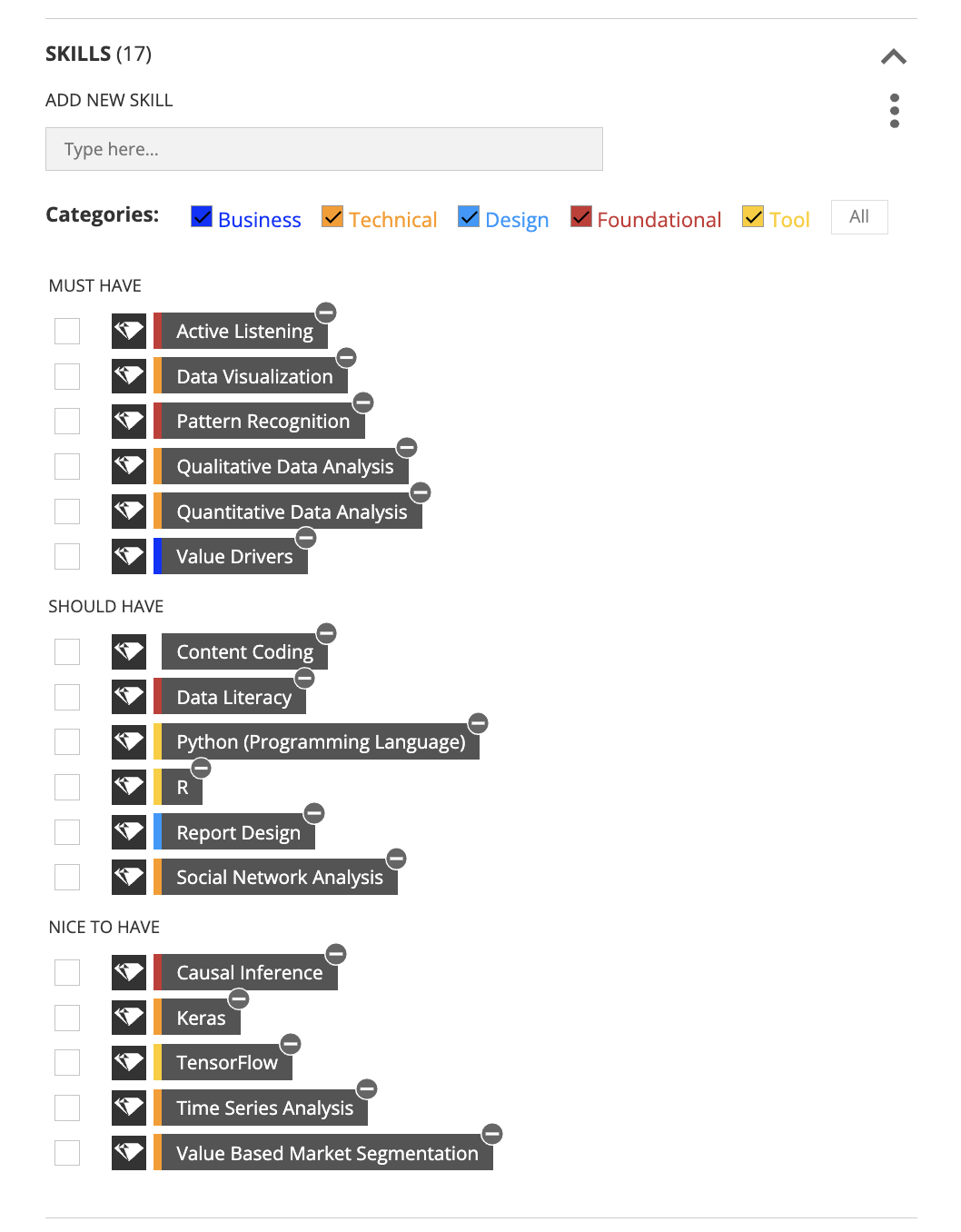Generic skills or granular skills in role coverage and skill gap analysis
Steven Forth is co-founder and managing partner at Ibbaka. See his skill profile here.
Ibbaka does a lot of work in role coverage and skill gap analysis. To do this sort of work, one needs to define the skills needed for specific roles. A question that often arises is how general or granular to make these skills.
One approach, often favoured by people outside the business, is to take a generalist approach and specify very high-level skills. People accountable for business performance are less sanguine. They tend to demand very specific skills and knowledge in order to actually deliver results. The loss of some seemingly arcane piece of knowledge or a very specific skill can cripple a business. This is especially true in knowledge intense industries, which encompass far more than software. Some of the most sophisticated skillsets are found in healthcare and advanced manufacturing.
I recently edged into this by asking a question across three different LinkedIn groups that I actively engage in.
On the Professional Pricing Society’s LinkedIn Group (18,500+ members) I asked
If someone said to you 'I am skilled in pricing' what other skills would you expect them to have?
On the Design Thinking Group managed by Ibbaka (191,000+ members) I asked
If someone said to you 'I am skilled in design thinking' what other skills would you expect them to have?
And on the new Service Led Growth Group, also managed by Ibbaka (170+ members) I asked
If someone said to you 'I am skilled in service led growth' what other skills would you expect them to have?
There were some interesting answers.
Skills for pricing from the Professional Pricing Society Community
Here is the laundry list from the comments.
Commercial acumen
Influencing
Cross functional collaboration
Analysis
Statistics
Research
Machine Learning and Artificial Intelligence
Mathematics
Finance
Sales
Estimation
Strategy
Customer needs
Negotiation
Skills for Design Thinking from the Design Thinking Community
Of course a rather different list of skills was suggested by the design thinking community.
User perspective
User testing
Idea generation
Collaboration
Empathy
Listening
Observation
Communication
Problem Solving
Design Fidelity Management
Design for Manufacturing
Qualify Opinions
Change Opinions
Empathy
Design Value Chain
Generative Thinking
Convergent Thinking
Critical Thinking
Concept Blending
Scenario Planning
Skills for Service Led Growth from the Service Led Growth Community
Service Led Growth is an emergent discipline. It will be important to define the roles and skills needed to execute on service led growth.
Value Chain
Value Chain Audit
Value Cycle
Value Understanding
Value Creation
Value Communication
Value Delivery
Value Documentation
Value Capture (Pricing)
Customer Value Journey
Service Design
Customer Centricity
Economic Value Estimation
Value Models
What roles and skills does Ibbaka use in its pricing and customer value management work?
Ibbaka’s mission is to support innovation and to help organizations to grow in the ways most meaningful to them. We do this in two ways. One is our work in skill management and our support for the transition to an open and skill based economy. An economy where careers are seen as a skein of roles that overlap each other and community, family and career roles are considered holistically.
Our other focus is to help companies understand value and pricing across the customer value journey. We do this through a combination of a software platform, the Value Pricing Dashboard, and a set of supporting services. We are currently running a Role Coverage and Skill Gap Analysis on this part of our business and have been updating the role and competency model. This has provoked a lot of internal discussion on how granular the skill descriptions need to be.
The basic structure for the model we are using is
Role
Activities
Skills
We also plan to add learning resources to each of the skills.
Here are the roles in the model. DCM is Discrete Choice Modelling, which includes Conjoint Analysis. VPD is short for Value Pricing Dashboard.
Let’s look deeper into one of these roles to see how granular the skills are. These are the Must Have and Should Have skills for the basic Market Consultant Role. These are the people who do the bulk of the consulting work.
To me this seems like a fairly good balance between generic and specific skills.
One could get a lot more granular. We are developing a pattern language for pricing models and we could list all of the different pricing models we can use in our design work. Or we could get even more granular and list the 100s of pricing metrics that exist across the pricing designs in the Value Pricing Dashboard. We don’t do that as the list of pricing metrics is growing constantly as companies move to usage based pricing. The Value Pricing Dashboard itself is a better place for those.
Let’s look at another role, say Data Analyst. Ibbaka needs to do a lot of specialized data analysis as part of its work.
This also seems like a pretty good balance. Again, we could get more granular with something like Social Network Analysis (SNA) algorithms we use in clustering and segmentation work. These come with names like K-Means, Fuzzy, Louvain and Leiden. We did not include these in the model. Perhaps we should as we need people who understand or who can quickly come to understand these algorithms. On the other hand, new algorithms show up all the time. Two months ago we did not use Leiden. So this is also a moving target and out Github repositories are a better place for this.
Then there is the question of where to put emergent technologies. We are making more and more use of tools like Keras and Tensorflow in artificial intelligence, and want to explore advanced approaches like Generative Adversarial Networks (GAN) to value and pricing configuration. Perhaps we need a model of our current skills and a different model for our future skills.
Finding the right balance between generic and granular skills
So how does one find the right balance between generic and granular skills?
The best way is to simply ask a person responsible for building a team what skills they look for and what skills are needed to ensure the team can achieve its goals. Practice trumps theory.
The skills need to be granular enough to support your positioning and differentiation. If every company in your industry would have the same skill list then the list does not represent what makes you different. Very few companies doing pricing work consider design thinking to be a core skill set. Ibabka does.
When you are covering a domain that changes quickly move one level up in the hierarchy. For Ibbaka, ‘algorithms’ would be too generic, but listing all of the rapidly changing algorithms used in social network analysis or machine learning would be too granular.
Role and skill models exist to help the business. They do not need to be comprehensive. They need to help answer questions and inform decisions.
What roles and skills do we need to deliver on our promises and achieve our goals?
Do we have the people we need to fill these roles?
What skills do we need to invest in?
These are critical questions. Can you answer them for your teams?
More posts on Role Coverage and Skill Gap Analysis
Generic skills or specific skills in role coverage and skill gap analysis
How should your organization measure role coverage and skill gaps?
Why Role Coverage and Skill Gap Analysis is Mission Critical
How is your organization collecting and using data about skill gaps?
How to Understand Skill Coverage for Key Roles in Your Organization - Ibbaka Demo





